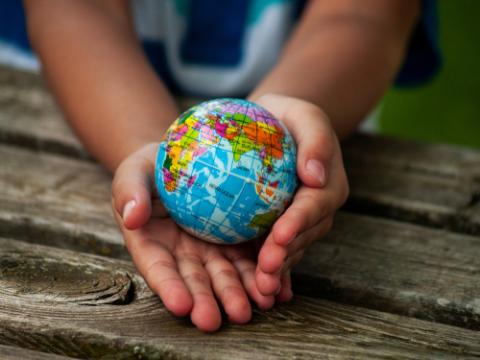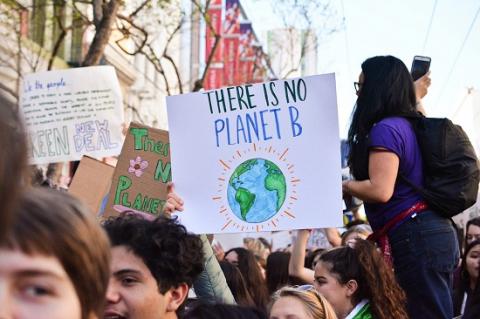
Supporting Climate Change Education
Launched by the La main à la pâte Foundation and the climate science community, the Office for Climate Education (OCE) promotes climate change education around the world.
Climatologist Eric Guilyardi has been involved with the project from the start, and he is now the president of the strategic council of the OCE. This interview highlights the objectives and stakes of this organization, which is under the aegis of UNESCO.
What are the main missions of the OCE?
Eric Guilyardi : OCE was created in 2018 in response to Article 12 of the Paris Agreement, which stressed the importance of climate science education. Its goal is to equip present and future generations with tools that can prepare them to live in a changing world and protect them from preconceptions and ideologies. To achieve this goal, the OCE's first mission is to create quality educational resources for teachers, who are often unprepared on this subject. More than 70 multilingual materials have been developed to date and are available free of charge (teaching guides, summaries of IPCC reports, multimedia animations, teacher training protocols, MOOC). All these resources are not only translated, but adapted, too, with local partners, to respond to the educational and socio-geographical contexts of different countries.
The OCE's second mission is to offer teachers professional development to familiarize them with climate science, active pedagogies and the setting up of projects that allow students to take action in their own way. Today, we have already reached more than 80,000 teachers and, through them, nearly one million students.
Our final mission is to support public policy. Within this framework, we accompany education systems around the world to help them create favorable environments for the implementation of quality climate change education. For example, we have supported the redesign of high school curricula in France.
What is your relationship with the IPCC?
E. G. : The OCE is in permanent contact with climatologists and researchers who contribute to the IPCC reports. The OCE has also been invited by the French Ministry of Ecological Transition to contribute to the governmental review of drafts of these reports on educational issues, and in 2021 became an observer organization of the IPCC.
What ties do you have to Sorbonne University ?
E. G. : Sorbonne University is one of the founding members of the OCE, along with La main à la pâte, the Institut de recherche pour le développement, Météo-France and the association Météo & Climat. It is now home to the OCE's operational team, which is a guarantee of credibility for our partners.
In addition, many climate researchers involved in the OCE in France work at the Pierre-Simon Laplace Institute, which has been involved in the OCE since its inception, and of which Sorbonne University is one of the supervisors. We also have strong links with the Maison pour la science de Paris (The Science House), which offers professional development in science for primary and secondary school teachers at Sorbonne University. We also work with the Institute for Environmental Transition, whose director is the university's representative on the OCE's strategic council.
In the future, we will propose other actions in partnership with the Sorbonne University Foundation and its partners. We also hope to take advantage of the multidisciplinary nature of Sorbonne University to develop more global approaches to climate change, particularly in relation to the human and social sciences.
Which countries are you working with?
E. G. : We work with more than 70 institutional, scientific, educational and financial partners in over 30 countries. Sixty percent of our activity concerns developing countries (in particular Latin America, Africa and Southeast Asia), 20 percent concerns European countries and 20 percent concerns France.
A first five-year pilot project was launched in Latin America to adapt the OCE's resources and train more than 15,000 teachers, in conjunction with local actors.
You work hand in hand with educators. Why is this essential?
E. G. : In order to promote equal opportunities for all, boys and girls, in climate change education, the OCE targets the education of children aged 9 to 15. To do so, it relies on two pillars: pedagogical expertise and climate sciences. This co-construction with education professionals is essential to design resources that are both based on scientific research and understandable for teachers and children. As climate scientists, we have expertise in higher education, but the pedagogy of small classes is very different. Primary school teachers do not always have sufficient scientific training to address these issues.
The OCE's scientific and pedagogical council is therefore made up of both scientists and pedagogues. It benefits from the expertise developed over the years by La main à la pâte Foundation in the field of science teaching in schools and from a rich international network.
What are the OCE's prospects for the next five years?
E. G. : To continue to develop and disseminate new resources on a large scale related to the upcoming IPCC reports. We also want to promote an interdisciplinary approach to climate issues (such as economic, social and philosophical). In particular, we will work on the issue of climate justice and gender equity, on the eco-anxiety that is increasingly present in schools, and on the development of critical thinking. We also want to facilitate the establishment of active communities for teachers by helping them to network.
Our second objective is to continue to support public policies, through a number of missions with which UNESCO is associated. We will also deploy new pilot projects in developing countries, particularly in Africa.


